Foundation for Rural & Regional Renewal (FRRR)
New partners join FRRR’s In a Good Place program
More funding is now on offer to support mental health projects in remote, rural and regional communities, thanks to new supporters of FRRR’s In a Good Place grants program, with grants of up to $20,000 are now available.
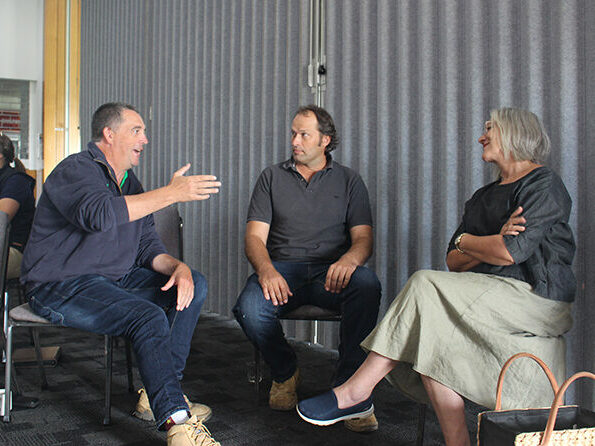
First established in 2018 with the support of CCI Giving, the program’s focus has been on supporting community-driven initiatives that reduce social isolation, increase social participation and connectedness, and increase help-seeking for people within rural, regional and remote communities who are at risk of, or are experiencing, mental health issues.
Now the IAGP program is expanding, adding a stream focussed on farmers and farming communities, following the recent National Farmer Wellbeing Report, which was presented at a recent mental health and wellbeing forum, hosted by National Farmers Federation (NFF).
The Report revealed that in recent years, 45% of Australian farmers have felt depressed, with 64% experiencing anxiety. The causes of this are many-fold, but top among them were weather or natural disasters (47%), financial stress (36%) and inflation and cost pressures (35%). Add to this that 76% of Australian farmers believe that the role they play is undervalued by the Australian public and it’s not hard to understand why farmers and farming communities are experiencing declining mental health.
The Report called for additional funding and support, which prompted six new partners to join FRRR’s IAGP program, alongside CCI Giving – Macdoch Foundation, Jibb Foundation, Morris Family Foundation, Norman Family Foundation and Rebecca Gorman & John Sevior.
These funders have committed to the program for three years, ensuring dedicated funding for farmers and farming communities from 2024-2026. In total, $1,063,000 has been committed over the next three years.
FRRR’s CEO, Natalie Egleton, said that the insights shared by farmers and farmer advocates, reaffirm the relevance of the In a Good Place program, and the role it can play in supporting the wellbeing of farming communities.
“These firsthand experiences and insights, highlight the need for investment in projects that promote preventative and responsive mental health approaches in farming and agriculture-dependent communities.
“Critically, the additional funding will help to address gaps in services by upskilling people locally and bringing in experts, so that locals in farming communities can better support one another.
“Thanks to the generous support of our new partners and CCI Giving, we can build on from the valuable impact that the IAGP program has had on rural Australia over the last six years, by ensuring farming communities can access more funding to develop the community-led, place-based solutions that make sense, locally,” Ms Egleton said.
Jeremy Yipp, Chair of CCI Giving, is also pleased to see the expansion of the program.
“The events of recent years have added complexity to the challenges that remote, rural and regional communities face. But we’ve seen first-hand that by supporting projects that remove barriers to people getting appropriate support, we can make a lasting difference. So it’s wonderful to have more organisations coming on board, enabling FRRR to support even more non-clinical approaches that are community-based and accessible at a grassroots level. It will mean that even more communities can access support,” Mr Yipp said.
Michelle Gortan, CEO of Macdoch Foundation, one of the new partners, said that due to increasingly variable weather conditions, financial and market pressures, and the need to navigate industry and land use transitions, there is a need to ensure farming communities are feeling well-supported.
“Maintaining good mental health and community wellbeing is multi-faceted and a lifelong process that requires a range of different approaches. We recognise that local communities know what will work in their particular context, and as a collective of funders, we are delighted to be partnering with FRRR so that that agricultural communities can design and implement community-led solutions that are fit for purpose.
“FRRR’s special tax status means that as partners, we can respond practically to the issues raised in the National Farmer Wellbeing Report and ensure funding reaches grassroots communities to support improved community wellbeing and mental health, which ultimately helps to create a stronger Australia,” Ms Gortan said.
The expanded program supports a range of approaches that are preventative or responsive in nature, reduce social isolation by increasing social participation and connectedness, and reduce stigma surrounding mental health by encouraging open discussion and supporting self-help-seeking. Communities of less 10,000 will receive priority.
Grants of up to $20,000 are available from a funding pool of at least $290,000. Grants are available via two streams:
- Community wellbeing – focussing on mental health and wellbeing within remote, rural and regional communities;
- Farmers and farming communities – supporting mental health and wellbeing of farmers and the communities they live in.
Applications are via an expression of interest process, with EOIs due 30 April, with final applications for those shortlisted due 15 May. Learn more at: https://frrr.org.au/funding/place/in-a-good-place/.
FRRR would also welcome more partners for this program. Potential supporters should contact partnerships@frrr.org.au or call 03 5430 2399.
By Jeanice Henderson, In a Good Place Program Coordinator
Despite the many positive aspects of living in remote, rural, and regional communities, there are also distinct challenges associated with distance and isolation, which place these communities at greater risk of poorer mental health outcomes.
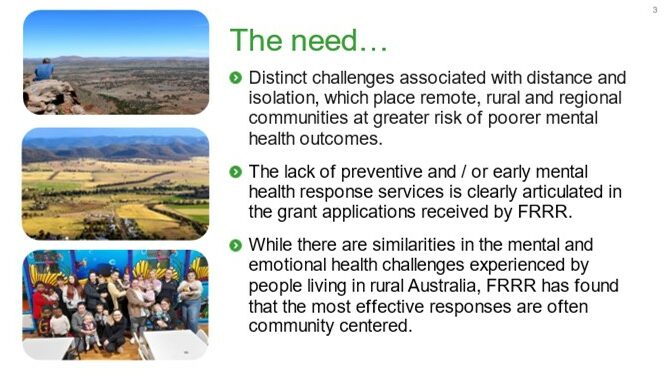
These include:
- Lack of available service or long wait times;
- Poor, interrupted or lack of digital services and access;
- Reduction in volunteers, business closures, job losses, loss of agricultural markets;
- Poorer outcomes in the social determinants of health;
- Life on the land can be hard – drought, fire, flood, mouse plague, cyclones; and
- Stigma, shame, and ‘stiff upper lip’ attitudes to mental health.
The compounding and accumulative effects of some or all of these things take their toll – on individuals, families and the communities they live in.
Local solutions need support
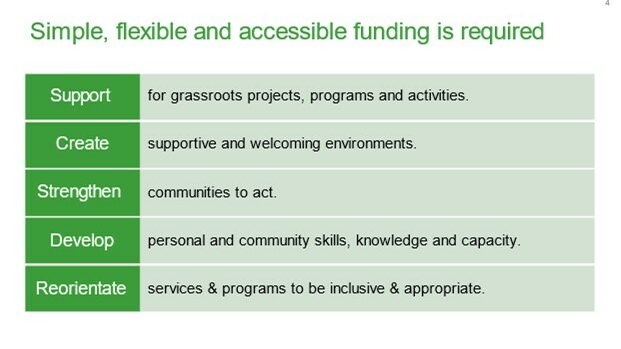
At FRRR, we have found that the most effective responses to these challenges are often community centered but lack access or visibility to government or philanthropic funding.
Simple, flexible and accessible funding is required to support projects, programs and activities that create supportive environments, strengthen communities to act, develop personal skills and support services to re-orientate their programs to be both inclusive and appropriate for all.
This is where philanthropy can play an important enabling role, especially for grassroots organisations that often can’t access traditional philanthropy.
Small grants can be the straightforward and friendly ‘front door’ through which grassroots organisations can step to build their capability, connect their community and navigate and drive change.
In fact, for many communities experiencing disadvantage, small grants are one of the few ways that they can get the resources and opportunities to launch new ideas or approaches in their communities.
While not always ‘sexy’, the projects and the needs met through these grants, can address areas of disadvantage and inequity in communities that often have little visibility to funders and policymakers.
We’ve seen this be particularly effective when those small grants are targeted toward addressing specific needs. A case in point is in the area of mental health.
In A Good Place
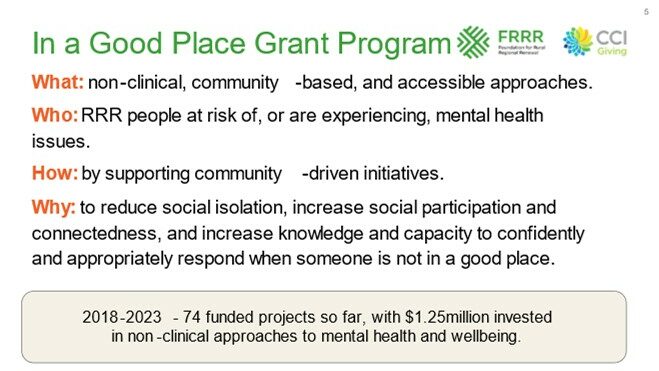
In a Good Place is a national philanthropic grant program, delivered by FRRR and funded in partnership with CCI Giving.
This aim is to support people living in remote, rural and regional communities seeking help who are at risk of, or are experiencing, mental health issues.
The program has a relatively small, flexible funding pool of $250,000 per year, and offers grants of up to $20,000 to enable rural communities to action their ideas and solutions.
Our focus is to support efforts to strengthen the mental health of at-risk or vulnerable people via services or activities that are preventative or responsive in nature and designed to engage those less likely or unable to participate in mental, social and emotional wellbeing activities.
This program truly reflects the FRRR ethos that local communities are best placed to identify local needs, local opportunities and lead local responses.
We have run the program since 2018 and have so far funded 84 projects – that’s $1.25 million in small grants invested into remote, rural and regional communities to support non-clinical approaches to mental health and wellbeing.
We’re very proud of it, but it’s really a drop in the ocean, as demand for this kind of support is very strong – and only increasing. Between 2018 and 2023, 397 applications requested over $6,443,348 in grant funding for combined total project cost of $18,981,059.
Further, 24.8% of these were first time applicants to FRRR, as this is one of the few programs of its type. And, in reality, they are not seeking very much funding – the average request was $16,230.
Of the successful applications:
- The smallest grant was $2,970.
- The average grant was $14,935.80.
- 23.8% were awarded the full grant amount ($20,000).
- Our $1.25 million support projects valued at over $4.5 million.
- Local communities are still putting in a lot – the estimated value of in-kind support for funded projects is $1,126,082.
Every dollar granted by the In a Good Place program was matched by an additional $2.61 in other funding or in -kind support.
Demand is high
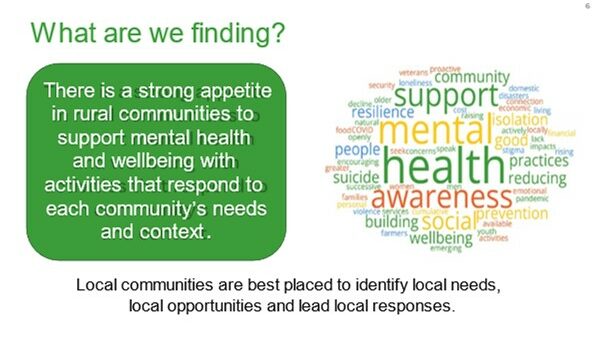
Since the program opened, more than 400 organisations have applied, requesting nearly $6.5 million towards projects with a combined value of over $19 million.
Remember, these are for relatively small grants – up to $20,000 – so it’s clear that there is a strong appetite out there to support community mental health and wellbeing.
Who benefits
So, just who is applying for these grants?
The short answer is grassroots community groups. FRRR doesn’t require applicants to have any special status, such as DRG1. This means we receive applications from community groups that are working directly with community members, families, young people, older people, veterans, gender specific focus groups, mental health and suicide awareness groups, community houses and school councils.
The word cloud above comes directly from the themes listed in this year’s In a Good Place applications. While there are different ideas that appear each round, there are some consistent themes and project approaches each round, including:
- Suicide prevention.
- Capacity building such as Mental Health First Aid training.
- Alleviating loneliness and isolation.
- Projects focused on the mental health of specific cohorts – men, youth, aged, students, families, farmers, culturally and linguistically diverse (CALD) communities.
- Community gardens / horticulture, animal therapy, art therapy nutrition and exercise as integral parts of overall mental health and wellbeing programs.
- Mental health and wellbeing awareness activities.
- Events that bring people together, connect with each other.
- Responding to the impacts of cumulative economic, social and emotional impacts of successive natural disasters and COVID.
Emerging themes of late have included:
- Community based support programs for ADF Veterans / First Responders.
- Supporting those affected by domestic violence.
- Responding to social determinants of mental health, such as food security, housing security / homelessness, disability and under / insecure employment.
- Increased recognition and use of lived experience and peer volunteers.
Proven impacts
There are many stories that we could share about the impacts of these grants and how they have contributed to building healthier, resilient and better-connected communities by supporting and promoting mental health awareness, and building individual and community resilience.
I’m Not Afraid To Talk
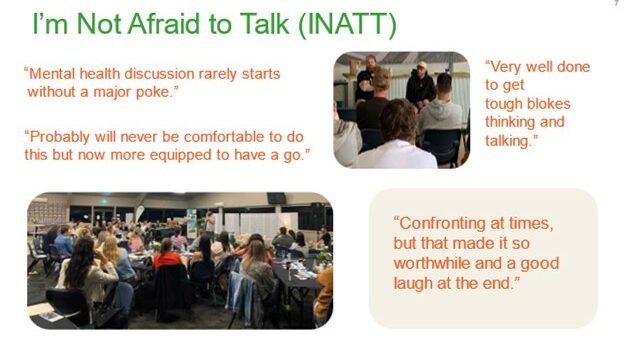
For example – University of South Australia partnered with a community group called I’m Not Afraid to Talk to pilot and evaluate a Men’s Mental Health program. It sought to challenge the stigma surrounding mental health – by doing so in an environment that is very familiar to local men and adolescents – the football club. The aim was to improve mental health and reduce the risk of suicide by providing a safe and informed environment in which to connect with others and normalise self-help seeking.
Working around COVID restrictions, cancellation of the football season, harvesting and extreme weather events, the workshops were held in Kimba, Tumby Bay and Cowell in SA.
Each four-hour workshop featured local speakers who shared their experienced, which was followed by a series of activities that focused on how men may be perceived by others and how they perceive themselves, shared experiences and the importance of ongoing open conversations about mental health.
Comments received after the football club presentations were interesting, but we particularly liked the insight from one man – “mental health discussion rarely starts without a major poke.:
Subsequently, a toolkit was developed by UniSA and INATT to guide the footy clubs in continuing the mental health conversation. The steps and strategies listed in the resource were based on community development principles.
INATT ran an additional workshop for women. This was extremely popular, with more than 80 women attending from Kimba and surrounding communities.
The project leveraged the extremely strong links INATT has with the Greater Flinders and Eastern Eyre communities, which was evident by their excellent leadership and facilitation of the workshops and high attendance, and the expertise of Uni SA in capturing the insights from each workshop and developing the community tool kits for clubs to use.
Melodies, Mates and Mental Health
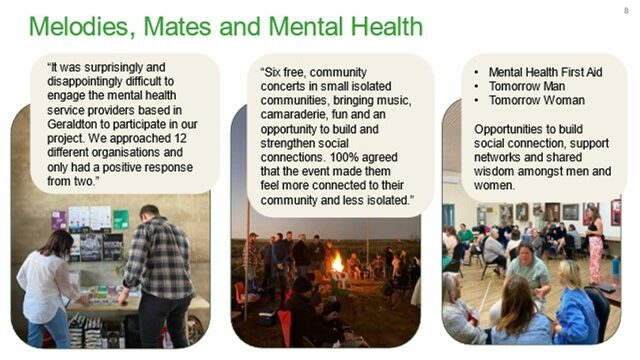
In another example, Mullewa is a small agricultural community in WA, which experiences the challenges of rural isolation, declining population, long distances and dependence on the weather for economic success in farming and tourism. These challenges were putting many at risk of poor physical and mental health, exacerbated by the consequences of COVID which saw events cancelled that traditionally brought people together and sustained strong social connections.
The Mullewa Community Resource Centre used their grant to deliver six free, community concerts in the smaller remote locations in the district. Each event brought people together for a BBQ, music and an interval during which there was a presentation regarding mental health. There was always a collection of resources that people could take home. They also conducted events in Mullewa at the end of the year and at the Mullewa Agricultural Show, which not only attracted the locals but visitors who were in town.
To really drive home the mental health message and develop the skills and capacity of the locals, the Resource Centre engaged a facilitator to run a Mental Health First Aid course. While only nine people attended, it actually meant that one additional skilled person was now available for every 50 adults in their community.
With the remaining funds, they engaged professionals to facilitate “Gather with the Women of Mullewa” and “A Night with the Blokes of Mullewa”, with both workshops focused on open, honest communication about how you are feeling with loved ones, family or friends.
Overall, they estimate about 500 people participated, sometimes more than once. The music events brought people together and built shared memories, while the training events built vital skills and networks and the confidence to use them when needed.
Creating a Safe Space
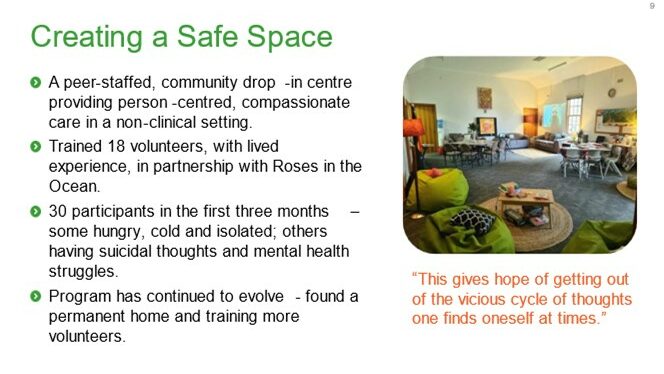
Another great example is local suicide prevention group, Every Life Matters (ELM), who teamed up with the Castlemaine Neighbourhood House to establish the Castlemaine Safe Space. It has become an inclusive venue for people to connect with others when feeling vulnerable.
Working with the local health services, ELM identified when there were local spikes in calls for assistance and pinpointed two evenings per week where there seemed to be a greatest need and aimed to operate over those times.
While the challenge was on to find a suitable location, the group worked with Roses in the Ocean and Living Works to develop a training schedule to support lived experience volunteers to work at the Safe Space during opening times. The In a Good Place program provided seed funding to support the training and purchase some basic equipment for the space.
Eighteen peer volunteers were trained in the first instance, and the centre welcomed more than 30 people through the doors in the first three months. Interestingly, most of them were male.
The Safe Space is now an independent group and has found a more permanent home. They have received additional funding to train more volunteers with lived experience to enable extended opening times and guard against fatigue, and to increase the visibility of the space in the local community. They have also gained funding support from the local Council. This is an innovative project and one that we watch with interest as it develops and progresses.
Small grants, big impact
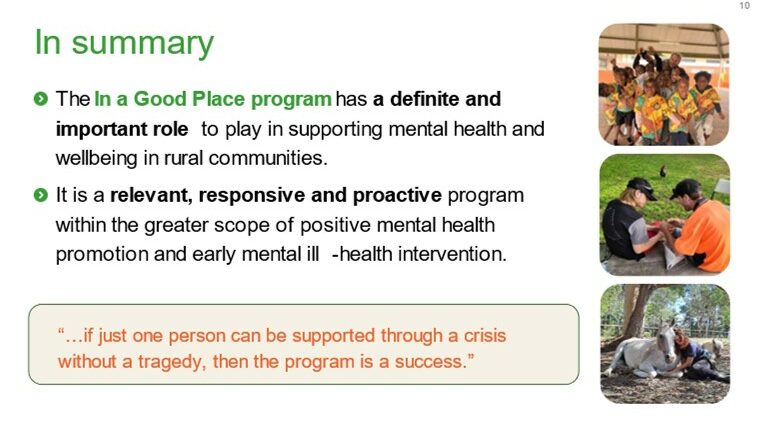
The In a Good Place program – and targeted small grants more generally, have a definite and important role to play in supporting rural communities to activate their ideas and solutions.
Analysis of final reports confirm that at a community level, the program has increased the knowledge and understanding of mental health issues in those rural communities, and helped to reduce stigma for those experiencing mental health challenges.
It is a relevant, responsive and proactive program within the greater scope of positive mental health promotion and early mental ill-health intervention.
We acknowledge that it is a relatively small contribution. But the communities we work with tell us they are forever grateful that the funds were available to support them.
One grantee sums this up perfectly, “If just one person can be supported through a crisis without a tragedy, then the program is a success.”
If you’d like to add your support to these kinds of impactful community-led projects, please contact our partnerships team.
$250,000 in grants awarded
FRRR’s In a Good Place (IAGP) program has awarded $250,000 in grants to 17 local organisations from remote, rural and regional Australia, for initiatives that will support and promote the mental health and wellbeing of locals in their communities.
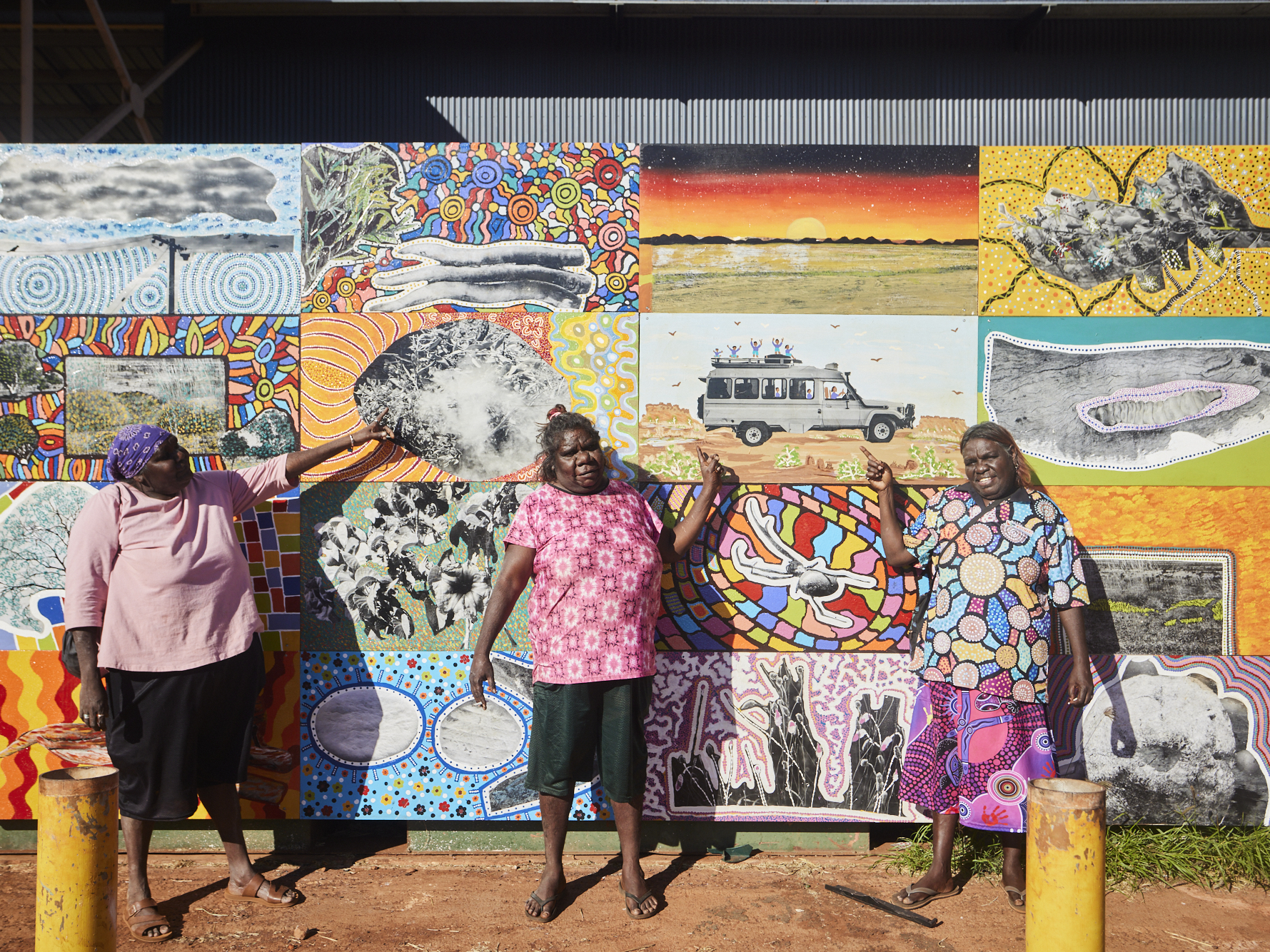
Funded in partnership with CCI Giving, the IAGP program gives small rural communities across Australia the opportunity to access funds of up to $20,000 for community-driven projects that support vulnerable community members who are at risk of, or are experiencing, mental health issues. Since 2018, the IAGP program has helped to fund 70 mental health-focused projects across remote, rural and regional Australia.
This year, the 17 funded initiatives include community activities to help people feel connected, training to help people identify those who are at risk of harming themselves, mental health first aid courses, and one-on-one mentoring.
Jeremy Yipp, Chair of CCI Giving, said support for mental health projects is vital for effective recovery to take place.
“In this round, we saw a notable increase in the number of expressions of interest that referenced community recovery from the accumulative economic, social and emotional impacts of successive natural disasters and the pandemic.
“We’re in a crucial period of recovery and now is the time to support mental health initiatives in rural Australia and make sure that communities have the resources they need to recover from all that’s gone on in the last few years,” Mr Yipp said.
Jill Karena, FRRR’s People Programs Portfolio Lead, said that loneliness is prevalent across rural communities and that many people are feeling disconnected from their community.
“In the applications for this round, we read about a lot of projects explicitly addressing loneliness and social isolation. For example, in the Queensland community of Stanthorpe, Happy Chat Peer Support Group will use a $20,000 grant to expand the organisation and provide facilitated support to vulnerable community members living with mental illness, helping to reduce their social isolation and loneliness, and to provide access to meaningful community-based activities.
“There is a clear need for social connection within remote, rural and regional communities and we’re grateful for our continued partnership with CCI Giving, as it allows us to provide much needed funding to help combat the loneliness we’re seeing in communities throughout rural Australia,” Ms Karena said.
Some of the 17 initiatives being funded include:
- Community Housing – Kempsey, NSW – Treasured Insights (Mental Health – Inside Out Recovery) – Build the capacity of community housing staff and tenants to understand hording and domestic squalor disorders to assist recovery and improve the lives of vulnerable people living in social housing. $14,588
- Sisters of Charity Community Care – Toowoomba, QLD – Dragonfly Health & Wellness Retreat – Enhance the mental health and wellbeing of rural women by providing a three-day retreat to enable participants to connect, learn self-care, and seek support. $11,000
- Yankalilla Youth Arts – Yankalilla, SA – Sunday Sessions – Provide a creative and nurturing space for young people to engage in guided arts and theatre-based activities, with the presence of a counsellor and support therapy dog to support mental health and wellbeing. $12,260
- Goulburn Valley Suicide Awareness Group Inc – Yea, VIC – GVSAG Walk and Talk – Support the local community to connect and develop trusted relationships that create greater understanding of mental health issues and address the stigma surrounding suicide by upskilling volunteers, establishing facilitated support groups and holding a suicide awareness walk. $20,000
- Enterprise Partnerships WA Limited – Balgo, WA – Piriwa Wellbeing Project – Develop individual resilience, confidence, group leadership and planning skills through intergenerational activities and regular yarning circles to strengthen cultural identity, self-agency and mental wellbeing of Aboriginal women in a remote community. $20,000
To support grants like this through FRRR, make a tax-deductible donation at https://frrr.org.au/giving/.
The full list of grant recipients and their projects are below.
| Organisation | Project | Location | Grant | |||
|---|---|---|---|---|---|---|
| In a Good Place - Round 7 - 2023 | ||||||
| NEW SOUTH WALES | ||||||
| Community Housing Limited | Treasured Insights (Mental Health - Inside Out Recovery) Build the capacity of community housing staff and tenants to understand hording and domestic squalor disorders to assist recovery and improve the lives of vulnerable people living in social housing. | Kempsey | $14,588 | |||
| Key Assets The Children's Services Provider NI-Connect Child and Family Wellbeing Unit | Norfolk Island Youth Centre Project Providing basic furnishings and equipment to facilitate the development of a local youth focused space promoting mental health and wellbeing and providing access to preventive and supportive programs. | Norfolk Island | $19,998 | |||
| Narrabri & District Community Aid Service Incorporated | R U OK Day and Suicide Prevention Business Evening Increase community awareness of mental health and reduce the stigma associated with help seeking behaviour by providing a community event with a guest speaker and take home resources. | Narrabri | $4,720 | |||
| Queer Family Inc | Resourcing Our Youth Increase community understanding and improve the confidence of young queer people to respond to homo/transphobia through the development and distribution of posters and local LGBTQIA+ mental health resources. | Mullumbimby | $13,000 | |||
| Rotary Club of Iluka Woombah Incorporated | Mental Health Warriors: Building Resilient Preteens Cultivate confidence and resilience in primary school children by supporting the development and delivery of a locally facilitated program to enhance student social and emotional wellbeing. | Iluka | $5,334 | |||
| Southern Women's Group Incorporated | Recovery Sanctuary Support the development of facilitated creative workshops and provision of materials to enable trauma informed workshops to take place in a safe and appropriate environment, supporting mental health, wellbeing and trauma recovery for women. | Bega | $11,000 | |||
| QUEENSLAND | ||||||
| Little Sparklers Ltd | Mental Health First Aid Training for Peer Support Volunteers and Volunteer Leaders Increase the knowledge and skills of rural-based peer volunteers, and increase the capacity of the organisation, by enabling Mental Health First Aid and Instructor training for those who provide phone crisis support for families during the postnatal period. | Various | $17,673 | |||
| Sisters of Charity Community Care Limited | Dragonfly Health & Wellness Retreat Enhance the mental health and wellbeing of rural women by providing a three day retreat to enable participants to connect, learn self-care, and seek support. | Toowoomba | $11,000 | |||
| Support Groups Queensland Inc Happy Chat Mental Health Peer Support Group | Happy Chat Mental Health Peer Support Stanthorpe - Building a Safe and Happy Place for People with a Lived Experience of Mental Ill Health Increase the capacity of a peer support group to expand and provide facilitated support to vulnerable community members living with mental illness to reduce social isolation, and to provide access to meaningful community based activities and nutritious food. | Stanthorpe | $20,000 | |||
| SOUTH AUSTRALIA | ||||||
| Tumby Bay Area School | Tumby Bay Area School G.E.M. Festival Build knowledge of, and community engagement with, the Gratitude, Empathy, Mindfulness (GEM) personal resilience initiative through a school based community event to highlight positive mental health and wellbeing. | Tumby Bay | $13,274 | |||
| Yankalilla Youth Arts Incorporated | Sunday Sessions Provide a creative and nurturing space for young people to engage in guided arts and theatre based activities, with the presence of a counsellor and support therapy dog to support mental health and wellbeing. | Yankalilla | $12,260 | |||
| TASMANIA | ||||||
| Highways and Byways Ltd Free2b Girls | Free2Fly Support isolated, vulnerable and disadvantaged young women to be confident and resilient through a one to one tailored mentoring program. | St Helens | $20,000 | |||
| VICTORIA | ||||||
| Castlemaine Safe Space Inc | Strengthen and Grow the Castlemaine Safe Space Increase organisational capacity and community awareness of available local mental health and social support by providing mental health training for lived experienced volunteers and increased promotion of the Castlemaine Safe Space. | Castlemaine | $13,000 | |||
| Goulburn Valley Suicide Awareness Group Inc | GVSAG Walk and Talk Support the local community to connect and develop trusted relationships that create greater understanding of mental health issues and address the stigma surrounding suicide by upskilling volunteers, establishing facilitated support groups and holding a suicide awareness walk. | Yea | $20,000 | |||
| HALT Hope Assistance Local Tradies | Older Adults Matter Too Increase the capacity and confidence of local community groups to better understand what a developing mental health problem or crisis looks like in older males and to have the skills and confidence to offer help-seeking information in an effort to reduce the incidences of suicide. | Castlemaine | $18,000 | |||
| WESTERN AUSTRALIA | ||||||
| Enterprise Partnerships WA Limited | Piriwa Wellbeing Project Develop individual resilience, confidence, group leadership and planning skills through intergenerational activities and regular yarning circles to strengthen cultural identity, self-agency and mental wellbeing of Aboriginal women in a remote community. | Balgo | $20,000 | |||
| Newdegate Community Resource Centre Inc | Men's BBQ Masterclass Workshop Enable men living in two farming districts to come together through a BBQ cooking demonstration and shared meal to hear a mental health presentation designed to reduce isolation and encourage open discussion about the importance of mental health self-care. | Newdegate | $16,153 | |||
Grants up to $20,000 on offer
Remote, rural and regional communities across Australia can apply now for grants up to $20,000 for community-driven mental health and wellbeing projects, through FRRR’s In a Good Place (IAGP) program.
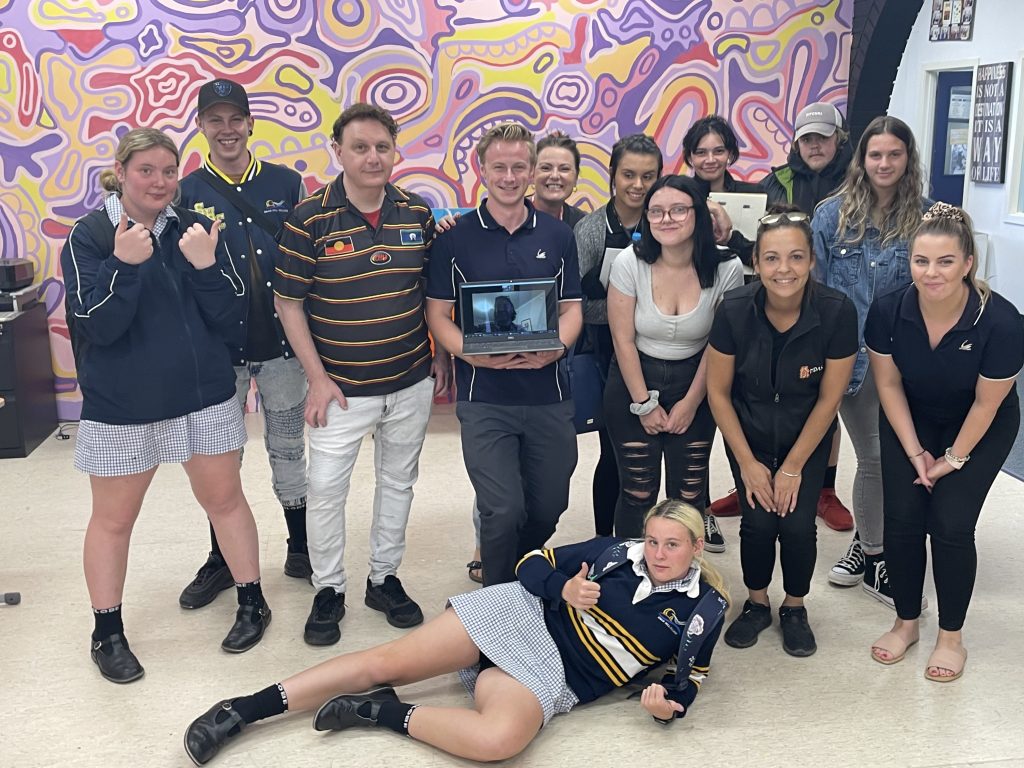
Community groups are invited to apply for up to $20,000 to support activities that empower locals to talk, connect, learn, participate and foster help-seeking behaviours.
FRRR and CCI Giving are offering $250,000 in IAGP grants, a boost of $50,000 on prior grant rounds, thanks to a new five-year partnership.
Jeremy Yipp, CCI General Manager, General Insurance Claims and Chair of CCI Giving, said that since partnering with FRRR in 2018, CCI Giving has seen the direct impact made to 53 mental health-focused projects funded across remote, rural and regional Australia.
“Seed funding is critical for the smaller community projects so that they can develop a proof of concept for their activity model and see what works and what doesn’t, and why. Without assistance from grant programs, such as In a Good Place, these projects may never have the opportunity to really get off the ground and reach their full potential,” Mr Yipp explained.
Jill Karena, FRRR’s People Programs Portfolio Lead, said that, now in its sixth year, the In A Good Place program continues to provide vital funding to support the mental health and wellbeing of communities across remote, rural and regional Australia.
“Projects funded through the In a Good Place program typically bring people together, sometimes to heal, always to learn.
“The program has a definite and important role to play in supporting rural communities in reducing the stigma surrounding mental health and help-seeking behaviours. It helps to bring mental health and wellbeing out in the open – making it OK to talk about and OK to reach out and ask for help,” Ms Karena said.
Applications opened on 12 April 2023. There is a two-stage application process. To get started, a brief Expression of Interest must be submitted no later than 5pm AEST, Wednesday 17 May 2023. Full details are available on FRRR’s website – https://frrr.org.au/in-a-good-place/. Applicants can also call 1800 170 020.

